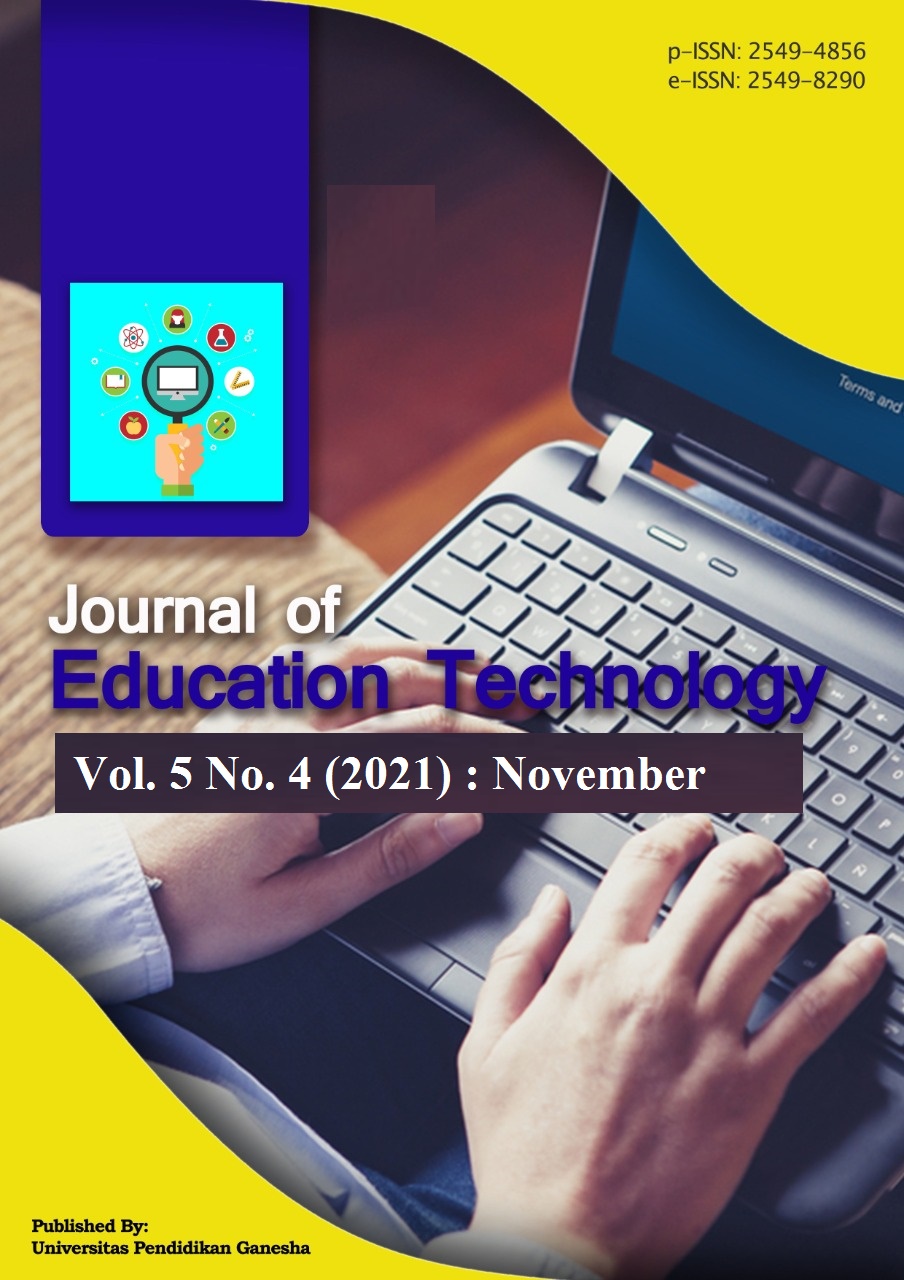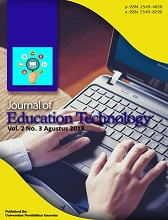Role-Playing Game as Learning Media To Support Online Learning
DOI:
https://doi.org/10.23887/jet.v5i4.39718Keywords:
Learning Media, Junior High School Student, Role-Playing GameAbstract
Lack of learning media will affect the learning process in the classroom. Various learning media can motivate students in online learning activities. It causes learning media to be essential in the learning process. In the current era of online learning, students are prone to boredom and stress. Therefore this study aims to develop learning media with RPG (Role Playing Games). This research is exploratory because the field of play is vast, with validation using an E-GameFlow survey to assess the level of comfort of players when gaining knowledge. The research will be conducted on 15 junior high school students by distributing online questionnaires. The methods used to collect data are observation and questionnaires. The instrument used to collect data is a questionnaire. The technique used to analyze the data is descriptive qualitative and quantitative analysis. The results of each question on each aspect of E-GameFlow will be analyzed to find conclusions about the games that have been made. The results of the data obtained show that the lowest value is 5.49 in the challenge aspect, which is caused by a static game map and lack of guidance regarding the game. The overall results of E-GameFlow show that the game can provide comfort to players while providing learning materials. This is evident from no aspect with a score below the average.
References
Abidah, A., Hidaayatullaah, H. N., Simamora, R. M., Fehabutar, D., & Mutakinati, L. (2020). The Impact of Covid-19 to Indonesian Education and Its Relation to the Philosophy of “Merdeka Belajar.” Studies in Philosophy of Science and Education, 1(1), 38–49. https://doi.org/10.46627/sipose.v1i1.9.
Agung, Guna, & Pudjawan. (2019). Game Education Mata Pelajaran Matematika Untuk Siswa Kelas IV SD Negeri 1 Paket. Jurnal Edutech Undiksha, 7(2), 2019. https://doi.org/10.23887/jeu.v7i2.21669.
Akyol, Z., & Garrison, D. R. (2011). Understanding cognitive presence in an online and blended community of inquiry: Assessing outcomes and processes for deep approaches to learning. British Journal of Educational Technology, 42(2), 233–250. https://doi.org/10.1111/j.1467-8535.2009.01029.x.
All, A., Castellar, E. N. P., & Looy, J. Van. (2021). Digital Game-Based Learning effectiveness assessment: Reflections on study design. Computers & Education, 167. https://doi.org/10.1016/j.compedu.2021.104160.
Anitha Kumari, T., Hemalatha, C. H., Subhani Ali, M., & Naresh, R. (2020). Survey on impact and learning’s of the online courses on the present era. Procedia Computer Science, 172, 82–91. https://doi.org/10.1016/j.procs.2020.05.167.
Bartel, A., & Hagel, G. (2014). Engaging students with a mobile game-based learning system in university education. International Journal of Interactive Mobile Technologies, 8(4), 957– 960. https://doi.org/10.3991/ijim.v8i4.3991.
Binali, T., Tsai, C.-C., & Chang, H.-Y. (2021). University students’ profiles of online learning and their relation to online metacognitive regulation and internet-specific epistemic justification. Computers & Education, 175. https://doi.org/10.1016/j.compedu.2021.104315.
Buchori, Rahmawati, S., & Wardani, S. (2017). The Development of A Learning Media for Visualizing the Pancasila Values Based on Information and Communication Technology. Jurnal Cakrawala Pendidikan, 36(3), 502–521. https://doi.org/10.21831/cp.v36i3.12748.
Chen, E., & Li, Z. (2011). On the application of multimedia technology in foreign language teaching and learning in China’s colleges: Challenges, problems and implications. 2011 International Conference on Multimedia Technology, ICMT 2011, 595–597. https://doi.org/10.1109/ICMT.2011.6001903.
Chen, Y.-L., & Hsu, C.-C. (2020). Self-regulated mobile game-based English learning in a virtual reality environmen. Computers & Education, 154. https://doi.org/10.1016/j.compedu.2020.103910.
Cintya, H. B., Mansoor, A. Z., & Ahmad, H. A. (2021). Cells at Work: Media Integration Mapping. Ultimart : Jurnal Komunikasi Visual, 1. https://doi.org/10.31937/ultimart.v14i1.2000.
Constant, T., & Levieux, G. (2019). Dynamic Difficulty Adjustment Impact on Players’Confidence. Glasglow: DL ACM, 1. https://doi.org/10.1145/3290605.3300693.
Dinayusadewi, N. P., Ngurah, G., & Agustika, S. (2020). Development Of Augmented Reality Application As A Mathematics Learning Media In Elementary School Geometry Materials. Journal of Education Technology, 4(2), 204–210. https://doi.org/10.23887/jet.v4i2.25372.
Elianta, P., Prestiliano, J., & Setiawan, T. A. (2018). Perancangan Board Game sebagai Media Pembelajaran Keselamatan Berkendara untuk Remaja dengan Mekanik Dice Rolling. International Journal of Natural Science and Engineering, 2(3). https://doi.org/10.23887/ijnse.v2i3.17186.
Emerson, A., Cloude, E. B., Azevedo, R., & Lester, J. (2020). Multimodal learning analytics for game‐based learning. British Journal of Educational Technology, 51(5). https://doi.org/10.1111/bjet.12992.
Giannakoulas, A., & Xinogalos, S. (2018). A pilot study on the effectiveness and acceptance. Education and Information Technologies, 1(2). https://doi.org/10.1007/s10639-018-9702-x.
Greipl, S., Moeller, K., & Ninaus, M. (2020). Potential and limits of game-based learning. International Journal of Technology Enhanced Learning, 12(4). https://doi.org/10.1504/IJTEL.2020.110047.
Gustiana, A. D., & Puspita, R. D. (2020). The Effect of Educative Games on the Physical Fitness of Kindergarten Children. Jurnal Pendidikan Jasmani Dan Olahraga, 5(2). https://doi.org/10.17509/jpjo.v5i2.24518.
Herdiansyah, H., Cholily, Y. M., & Cahyono, H. (2019). The Development of Interactive Instructional Media Using Adobe Flash in a Form of Game on the Geometry Lesson (Cube and Cuboid) for Secondary School. Mathematics Education Journal, 3(1), 32. https://doi.org/10.22219/mej.v3i1.8418.
Hergenrather, M. (2020). Dynamic Difficulty: A Player Perspective. WRIT: Journal of First-Year Writing, 1. https://doi.org/10.25035/writ.03.01.04.
Hermawan, D. P., Herumurti, D., & Kuswardayan, I. (2017). Efektivitas Penggunaan Game Edukasi Berjenis Puzzle, Rpg Dan Puzzle Rpg Sebagai Sarana Belajar Matematika. JUTI, 15(2). https://doi.org/10.12962/j24068535.v15i2.a663.
Kartika, Y., Wahyuni, R., Sinaga, B., & Rajaguguk, J. (2018). Improving Math Creative Thinking Ability by using Math Adventure. Journal of Physics: Conference Series, 6(1). https://doi.org/10.1088/1742-6596/1179/1/012078.
Kido, Y., Tou, N. P., Yanai, N., & Shimojo, S. (2020). sD&D: Design and Implementation of Cybersecurity Educational Game with Highly Extensible Functionality. Future of Information and Communication Conference, 1. https://doi.org/10.1007/978-3-030-39445-5_62.
Kim, P., Buckner, E., Kim, H., & Makany, T. (2012). A comparative analysis of a game-based mobile learning model in low-socioeconomic communities of India. International Journal of Educational Development, 3(2). https://doi.org/10.1016/j.ijedudev.2011.05.008.
Kucker, S. C. (2021). Processes and pathways in development via digital media: Examples from word learning. Infant Behavior and Development, 63. https://doi.org/10.1016/j.infbeh.2021.101559.
Kusuma, G. P., Suryapranata, L. K. P., & Utomo, Y. (2021). Enhancing Historical Learning Using Role-Playing Game on Mobile Platform. Procedia Computer Science, 179. https://doi.org/10.1016/j.procs.2021.01.078.
Lauc, T., Jagodić, G. K., & Bistrović, J. (2020). Effects of Multimedia Instructional Message on Motivation and Academic Performance of Elementary School Students in Croatia. International Journal of Instruction, 13(4), 491–508. https://doi.org/10.29333/iji.2020.13431a.
Li, F.-Y., Hwang, G.-J., Chen, P.-Y., & Lin, Y.-J. (2021). Effects of a concept mapping-based two-tier test strategy on students’ digital game-based learning performances and behavioral patterns. Computers & Education, 24. https://doi.org/10.1016/j.compedu.2021.104293.
Mathew, R., Malik, S. I., & Tawafak, R. M. (2019). Teaching Problem Solving Skills using an Educational Game in a Computer Programming Course. Vilniaus Universiteto Leidykla. https://doi.org/10.15388/infedu.2019.17.
Mufaziah, E., & Fauziah, P. (2020). Kendala Orang Tua dalam Mendidik Anak Usia Dini pada Saat Pandemi Covid 19. Jurnal Obsesi, 5(2). https://doi.org/10.31004/obsesi.v5i2.746.
Nonthamand, N. (2020). Guideline to develop an instructional design model using video conference in open learning. International Journal of Emerging Technologies in Learning, 15(3), 140–155. https://doi.org/10.3991/ijet.v15i03.10842.
Partovi, T., & Razavi, M. R. (2019). The effect of game-based learning on academic achievement motivation of elementary school students. Learning and Motivation, 68. https://doi.org/10.1016/j.lmot.2019.101592.
Prasetyo, G., Hidayatullah, M. F., Akhyar, M., Wiranto, & Perdana, R. (2020). Strengthening Students’ Character Through Multimedia Learning In Primary Schools Education: Systematic LiteraturPrasetyo, G., Hidayatullah, M. F., Akhyar, M., Wiranto, & Perdana, R. (2020). Strengthening Students’ Character Through Multimedia Learning In . Humanities & Social Sciences Reviews, 8(3), 268–277. https://doi.org/10.18510/hssr.2020.8328.
Pratama, L. D., & Setyaningrum, W. (2018). Game-Based Learning: The effects on student cognitive and affective aspects. Journal of Physics: Conference Series, 1097(1–7). https://doi.org/10.1088/1742-6596/1097/1/012123.
Rahayuningsih, S. (2020). Animation media of animal husbandry thematic science learning to stimulate scientific attitude in early childhood. International Journal of Scientific and Technology Research. https://doi.org/10.23887/jet.v3i1.17959 Article Metrics.
Rekysika, N. S., & Haryanto, H. (2019). Media Pembelajaran Ular Tangga Bilangan Untuk Meningkatkan Kemampuan Kognitif Anak Usia 5-6 Tahun. Cakrawala Dini: Jurnal Pendidikan Anak Usia Dini, 10(1), 56–61. https://doi.org/10.17509/cd.v10i1.16000
Rigianti, H. A. (2020). Kendala Pembelajaran Daring Guru Sekolah Dasar Di Banjarnegara. Elementary School: Jurnal Pendidikan Dan Pembelajaran Ke-SD-An, 7(2). https://doi.org/10.31316/esjurnal.v7i2.768.
Saprudin, S., Liliasari, L., Setiawan, A., & Prihatmanto, A. (2019). The effectiveness of using digital game towards students’ academic achievement in small and large classes: A comparative research. International Journal of Learning, Teaching and Educational Research, 18(12), 196–210. https://doi.org/https://doi.org/10.26803/ijlter.18.12.12.
Setiyani, S., Fitriyani, N., & Sagita, L. (2020). Improving student’s mathematical problem solving skills through Quizizz. JRAMathEdu (Journal of Research and Advances in Mathematics Education), 5(3), 276–288. https://doi.org/10.23917/jramathedu.v5i3.10696.
Simbolon, N., & Satria, A. (2016). Making Ludo Word Game (LWG) to Learn Grammar for Senior High School Students. Inovish Journal, 1(2), 77–85. https://doi.org/10.35314/inovish.v1i2.85.
Su, C.-H., & Cheng, C.-H. (2013). A Mobile Game-based Insect Learning System for Improving the Learning Achievements. Procedia - Social and Behavioral Sciences, 103. https://doi.org/10.1016/j.sbspro.2013.10.305.
Sun, H., & Gao, Y. (2016). Impact of an active educational video game on children’s motivation, science knowledge, and physical activity. Journal of Sport and Health Science 5, 1(1), 239–245. https://doi.org/10.1016/j.jshs.2014.12.004.
Troussas, C., Krouska, A., & Sgouropoulou, C. (2020). Collaboration and fuzzy-modeled personalization for mobile game-based learning in higher education. Computers & Education, 144. https://doi.org/10.1016/j.compedu.2019.103698.
Van Alten, D. C. D., Phielix, C., Janssen, J., & Kester, L. (2019). Effects of flipping the classroom on learning outcomes and satisfaction: A meta-analysis. Educational Research Review, 28(June), 1–18. https://doi.org/10.1016/j.edurev.2019.05.003.
Windhiyana, E. (2020). Dampak Covid-19 Terhadap Kegiatan Pembelajaran Online Di Perguruan Tinggi Kristen Di Indonesia. Perspektif Ilmu Pendidikan, 34(1), 1–8. https://doi.org/10.21009/pip.341.1.
Wulandari, R., Susilo, H., & Kuswandi, D. (2017). Penggunaan Multimedia Interaktif Bermuatan Game Edukasi Untuk Siswa Sekolah Dasar. Jurnal Pendidikan: Teori , Penelitian Dan Pengembangan, 2(8), 1024–1029. https://doi.org/10.17977/jptpp.v2i8.9759.
Yeh, Y. T., Hung, H. T., & Hsu, Y. J. (2017). Digital game-based learning for improving students’ academic achievement, learning motivation, and willingness to communicate in an english course. International Congress on Advanced Applied Informatics. https://doi.org/10.1109/IIAI-AAI.2017.40.
Yulia, H. (2020). Online Learning to Prevent the Spread of Pandemic Corona Virus in Indonesia. ETERNAL (English Teaching Journal), 11(1). https://doi.org/10.26877/eternal.v11i1.6068.
Yunanto, A. A., Herumurti, D., Rochimah, S., & Kuswardayan, I. (2019). English Education Game using Non-Player Character Based on Natural Language Processing. Procedia Computer Science, 1. https://doi.org/10.1016/j.procs.2019.11.158.
Downloads
Published
How to Cite
Issue
Section
License
Authors who publish with the Journal of Education Technology agree to the following terms:
- Authors retain copyright and grant the journal the right of first publication with the work simultaneously licensed under a Creative Commons Attribution License (CC BY-SA 4.0) that allows others to share the work with an acknowledgment of the work's authorship and initial publication in this journal.
- Authors are able to enter into separate, additional contractual arrangements for the non-exclusive distribution of the journal's published version of the work (e.g., post it to an institutional repository or publish it in a book), with an acknowledgment of its initial publication in this journal.
- Authors are permitted and encouraged to post their work online (e.g., in institutional repositories or on their website) prior to and during the submission process, as it can lead to productive exchanges, as well as earlier and greater citation of published work. (See The Effect of Open Access)


















